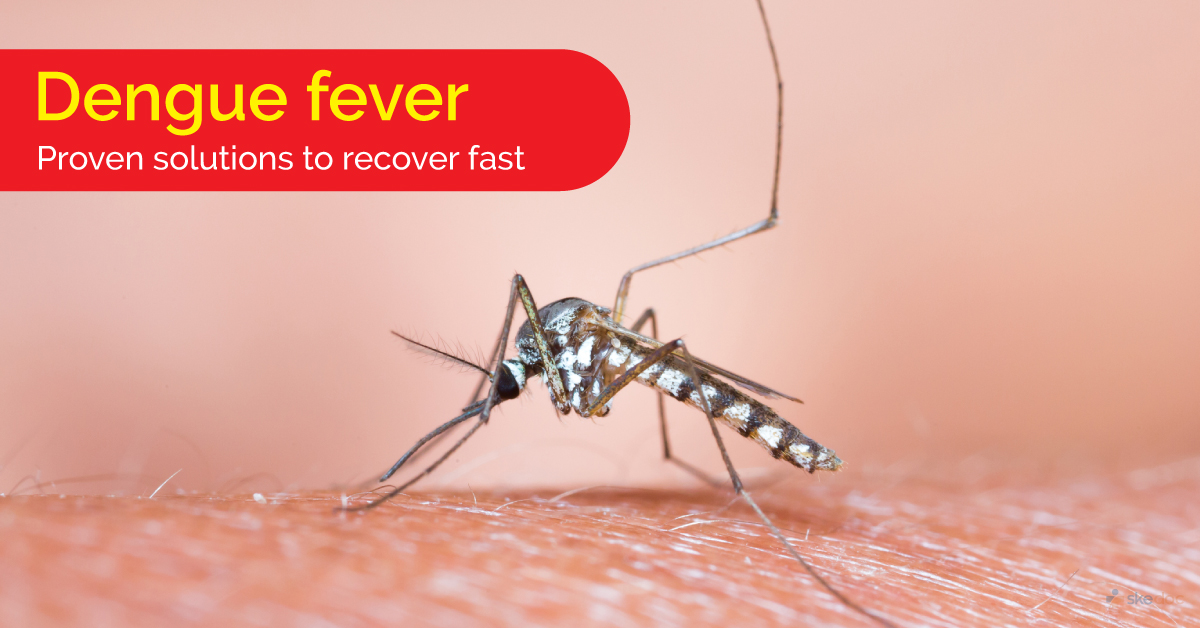Allergy
Blood Diseases
Bone & Joints
Brain
Cancer
Child Care
Cosmetic Surgery
Diabetes
Endocrinology
ENT
Eye
Gen Medicine
General Surgery
Heart
Kidney
Lifestyle
Liver & Digestive
Lung
Men’s Health
Mental health
Physiotherapy
Rheumatology
Skin and hair
Sleep Disorders
Spine
Transplant
Women Health
Thyroid
Vascular Surgery
Dengue Fever- Proven solution to recover fast

Description
Dengue fever also known as break bone fever is a mosquito-borne viral infection with flu-like characteristics. The virus is transmitted through mosquitoes and ticks. Dengue fever occurs in regions with tropical and sub-tropical climates.
Types of This Condition
It is classified into two types depending on the intensity of the symptoms.
Uncomplicated Dengue Fever: A fever associated with mild symptoms that resolve within a week is termed as uncomplicated dengue fever.
Severe Dengue or Dengue Hemorrhagic Fever: Fever associated with severe internal bleeding, plasma leakage, or organ dysfunction is termed as dengue hemorrhagic fever. This is subdivided into IV grades. The last two grades are termed as Dengue Shock Syndrome. Shock is a phase that can lead to low blood pressure and organic failure.
Causes
Dengue fever is caused by one of the four dengue viruses.
The four dengue virus serotypes are DENV-1, DENV-2, DENV-3, and DENV-4. The virus is spread through a mosquito species, called Aedes. These kinds of mosquitoes are daytime biters. They would be active in the hours before sunrise and during sunset.
Risk Factors
Risk factors that influence the development of dengue fever are:
- Living in tropical areas
- Traveling to tropical areas or dengue-endemic places
- Being a prior victim of the disease
Symptoms & Signs
Signs and symptoms of dengue fever develop 3 to 14 days after being infected. They include:
- High fever up to 104 degrees Fahrenheit
- Headache
- Muscle and joint pains
- Nausea and vomiting
- Skin rash
In a few cases, symptoms worsen and can lead to a severe form of dengue fever called severe dengue or dengue hemorrhagic fever. This causes low platelet count and bleeding. It can further progress to dengue shock syndrome where blood pressure drops drastically becoming life-threatening. Some of the signs and symptoms of these conditions include:
- Bleeding from gums and nose
- Bruising under the skin
- Severe abdominal pain
- Blood in vomit, urine, or stool
- Fatigue
- Persistent vomiting
- Difficulty breathing
An individual who has suffered dengue fever once is at an increased risk of experiencing more severe symptoms if infected again.
Diagnosis
A diagnosis of dengue fever is made based on medical history, clinical evaluation, and the results of blood tests. Low white cell count, low platelets, and increased hematocrit level usually indicate positive dengue fever.
Dengue fever is quite difficult to diagnose because its symptoms are more similar to other viral illnesses like malaria or typhoid. A complete physical examination is performed considering both the medical and travel history of an individual.
A complete blood test is done to evaluate the levels of white blood cells, platelets, and hematocrit.
Course
The course of the dengue fever is divided into three phases:
Febrile: At this phase, an individual suffers from high fever potentially up to 104 degrees Fahrenheit associated with muscle and joint pains, headache, nausea, and dehydration. A type of skin rash also develops. This phase lasts for 4 days.
Critical: At this phase, platelets count in the blood declines rapidly, and white blood cell count decreases. Symptoms include abdominal pain, vomiting, bleeding from the gums and nose, mild fluid accumulation in the body, and increased skin rash. The critical phase of dengue fever is called dengue hemorrhagic fever. This state can further progress to dengue shock syndrome which can lead to death. This phase lasts for 2 to 3 days.
Recovery: The last phase of dengue is recovery. The leaked fluids are reabsorbed into the bloodstream and the platelets count is restored. This phase lasts for 4 days; however, the weakness in the body can last for many weeks.
Treatment Options
There is no specific treatment for dengue fever. There are no particular antiviral drugs to treat the disease. The treatment focuses on reducing the symptoms. Taking rest and consuming plenty of liquids is recommended to avoid dehydration.
Medical Treatment
- Analgesics - Such as acetaminophen are prescribed to reduce fever. Aspirin and NSAIDs such as ibuprofen, are avoided as they can increase the risk of bleeding.
Interventional Treatment Including Surgery and Indications For Surgery/Surgical Treatment
- Blood Transfusion - In severe cases of dengue fever, a blood transfusion is necessary. Packed red blood cells or whole blood is transfused. Usually, platelets and fresh frozen plasma are not transfused.
Radiation
NA
Non-Medical - Role Of Diet/Exercise/Lifestyle Changes/ Preventive Measures
The primary preventive measure for dengue fever is to avoid mosquito bites
- Using mosquito repellents and mosquito nets during rest
- Avoiding outdoor activities during dusk
- Wearing clothes that fully cover the skin
- Keeping the surroundings clean without excess garbage or water stagnation
- Shutting windows and door screens to avoid mosquitoes entering indoor spaces
Complications
A critical phase of dengue fever can lead to complications like internal bleeding, shock, and organ dysfunction. Some of the complications associated with dengue fever are:
- Altered level of consciousness, febrile seizures, and neurological disorders
- Damage to organs like the liver, lungs, kidneys, and heart
- Dengue fever in a pregnant woman can cause miscarriage, premature birth, or low birth weight
Prognosis
Diagnosing and treating dengue fever at an early stage can result in complete recovery and a good prognosis. Nevertheless, in a critical phase of dengue fever, there is a possibility of excessive internal bleeding, irreversible shock, and organ impairment leading to a life-threatening condition and death.
Was this article helpful?
YesNo
Comments





